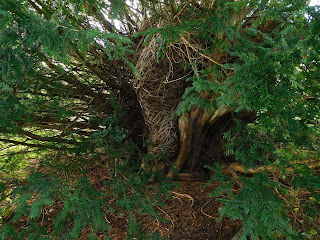To Cumbria this last weekend, for a literary festival based at the Roman Museum in Maryport. We'd had this booked for months, not anticipating the apocalyptic weather on its way for the North. - Very high winds from Storm Abigail, followed by torrential rain, then - yes - more high wind.
Arriving by train on Wednesday, we picked up a hire car in Carlisle and drove south. The wind was already picking up, but rain was only forecast for later on Thursday, so we made a brisk start.
Out on the High Nook Tarn path above Loweswater, we found clusters of walkers making the most of a fine day after a rainy week - fine, but roaring with wind. My Newfoundland Mittens were no match for these gusts, which simply blew straight through them. The heretical word "Thinsulate" kept whispering in my ear.
The trees in the lakeside woodlands still held on to enough of their leaves to light up our return: damp copper and gold.
Friday found me taking my seat in a writers' workshop led by Kathleen Jones. Immediately, it was obvious that the other participants were veterans, knocking out complete, well-crafted short stories and poems on demand. Long experience of writing model answers for teenagers proved of no help here. Outside, "wind wielded bladelight", as Ted Hughes has it - the Roman Museum is right up on top of the hill, exposed to the elements.
The workshop over, we drove up the coast, past signs warning that the road was closed ahead. This would be Dubmill Point, where at high tide the spray lifts pebbles from the beach and pelts the road -and any passing traffic - with them. We detoured inland, to one of our favourite teashops at Mawbray.
The evening brought with it a presentation by Melvyn Bragg, on his book "Now Is The Time", a novel set at the time of the Peasants' Revolt. He entered the room and immediately sat down in the audience to chat to friends. Wearing a black corduroy suit and a shirt with cuff-links, he was, something you don't see every day in Maryport - or Essex, for that matter. Once launched on his subject, he gave his characters considerably more life than they appear to have in the book, so far as I have read it. Joan, the Maid of Kent, mother of Richard the Second, was what might be called a bit of a goer - certainly worth Googling if you have never heard of her. Outside, the wind continued to roar; as Melvyn remarked, it felt like being on a ship with the added comfort of knowing that we were not at sea.

Saturday was due to be very wet later. In fact, eight inches of rain were forecast to fall within twenty-four hours. Flood warnings had been issued for local towns; serious weather. We took an early bracing walk up the beach from Wolsty Banks, then headed inland to lunch at the Pheasant Inn, a snug retreat on such a dismal day. Roast guinea fowl - delicious!
More on the Festival later - this was my first ever experience of such an event but, hopefully, not my last.


















































.JPG)